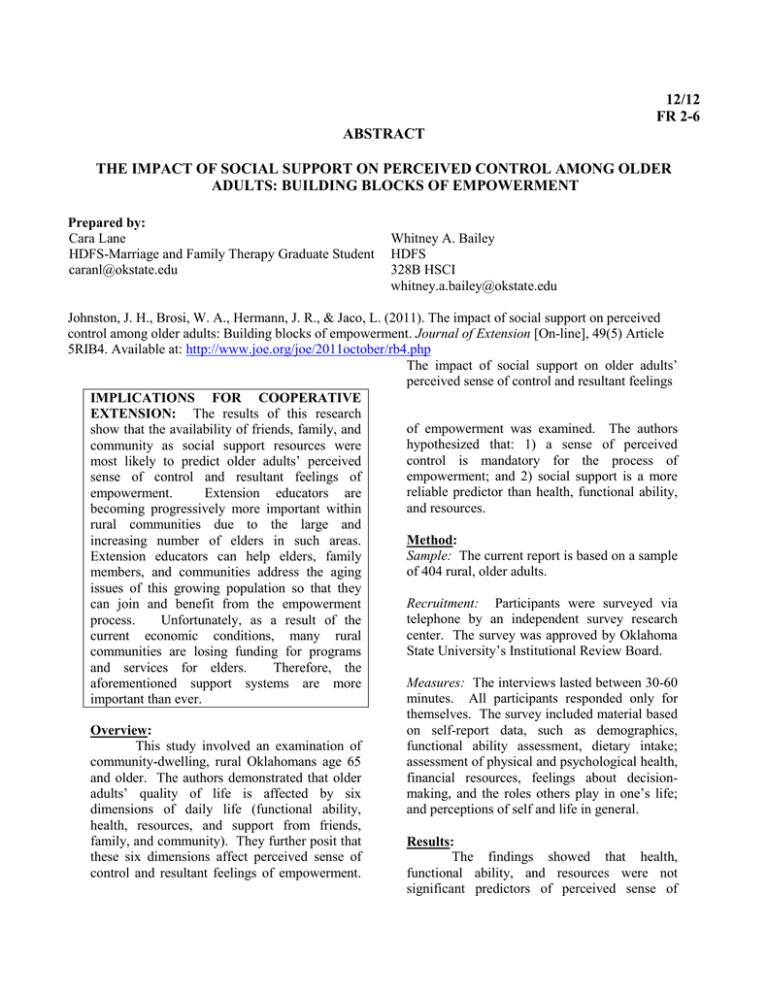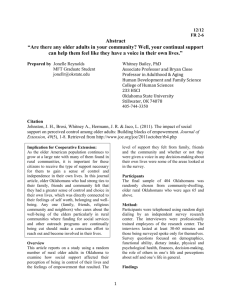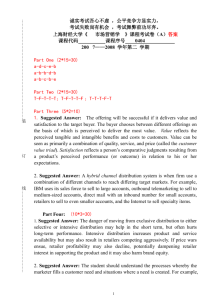12/12 FR 2-6 ABSTRACT THE IMPACT OF SOCIAL SUPPORT ON
advertisement

12/12 FR 2-6 ABSTRACT THE IMPACT OF SOCIAL SUPPORT ON PERCEIVED CONTROL AMONG OLDER ADULTS: BUILDING BLOCKS OF EMPOWERMENT Prepared by: Cara Lane HDFS-Marriage and Family Therapy Graduate Student caranl@okstate.edu Whitney A. Bailey HDFS 328B HSCI whitney.a.bailey@okstate.edu Johnston, J. H., Brosi, W. A., Hermann, J. R., & Jaco, L. (2011). The impact of social support on perceived control among older adults: Building blocks of empowerment. Journal of Extension [On-line], 49(5) Article 5RIB4. Available at: http://www.joe.org/joe/2011october/rb4.php The impact of social support on older adults’ perceived sense of control and resultant feelings IMPLICATIONS FOR COOPERATIVE EXTENSION: The results of this research of empowerment was examined. The authors show that the availability of friends, family, and hypothesized that: 1) a sense of perceived community as social support resources were control is mandatory for the process of most likely to predict older adults’ perceived empowerment; and 2) social support is a more sense of control and resultant feelings of reliable predictor than health, functional ability, empowerment. Extension educators are and resources. becoming progressively more important within rural communities due to the large and Method: increasing number of elders in such areas. Sample: The current report is based on a sample Extension educators can help elders, family of 404 rural, older adults. members, and communities address the aging issues of this growing population so that they Recruitment: Participants were surveyed via can join and benefit from the empowerment telephone by an independent survey research process. Unfortunately, as a result of the center. The survey was approved by Oklahoma current economic conditions, many rural State University’s Institutional Review Board. communities are losing funding for programs and services for elders. Therefore, the Measures: The interviews lasted between 30-60 aforementioned support systems are more minutes. All participants responded only for important than ever. themselves. The survey included material based on self-report data, such as demographics, Overview: This study involved an examination of functional ability assessment, dietary intake; community-dwelling, rural Oklahomans age 65 assessment of physical and psychological health, and older. The authors demonstrated that older financial resources, feelings about decisionadults’ quality of life is affected by six making, and the roles others play in one’s life; dimensions of daily life (functional ability, and perceptions of self and life in general. health, resources, and support from friends, family, and community). They further posit that Results: these six dimensions affect perceived sense of The findings showed that health, control and resultant feelings of empowerment. functional ability, and resources were not significant predictors of perceived sense of control. Further, while support from friends was not a significant predictor of perceived sense of control as part of the model, it would be a significant predictor by itself; therefore, all support variables (friends, family, and community) were significant variables of perceived sense of control. Discussion: Many assume in American culture that the healthier an individual is, the more empowered they will feel. The results of this study reveal this is not the case; neither functional ability nor health and well-being were a significant predictor of perceived sense of control. However, social support resources were found to be better predictors of older adults’ perceived sense of control than functional ability, health, and resources. The authors assert that this study will allow us to better facilitate empowerment among rural older adults through an improved understanding of the predictors of perceived sense of control and the empowerment process.




